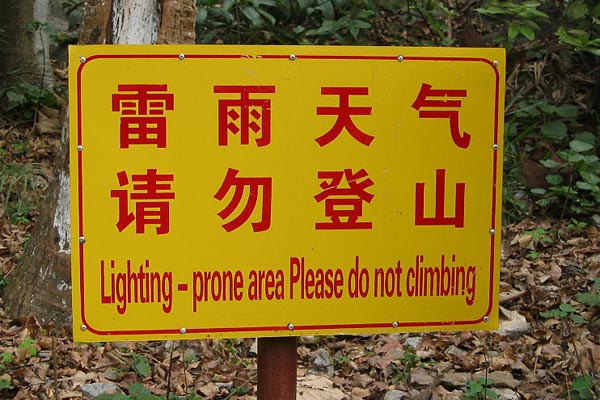 |
| Can you spot the problem with this sign's English? (Wikipedia) |
Note: Although the mistakes Amanda makes below are typical for Chinese learners of English, others make them too! In any case, it's helpful to learn how to spot errors. Read Part II and Part III of this conversation when you're finished.
Get Ready: Is it ever okay to use a "be verb" and a "do verb" together? For example, "I am go to school" or "I was go to school"?
In the conversation below, Amanda (a Chinese girl) makes many mistakes that are referred to as "Chinglish." How many can you find?
Billy: How are you?
Amanda: How are you?
Billy: Pretty good, thanks. Say, have you ever traveled outside of China?
Amanda: Yes, I have ever been to your United States.
Billy: Really?
Amanda: Dui. I was go to New York.
Read more: https://en.wikipedia.org/wiki/Chinglish
Practice: Match the mistake to its correction.
- How are you? (as a reply)
- I have ever been...
- your United States
- Dui
- I was go...
- the United States
- Yes.
- Fine thanks. And you?
- I went...
- I have been...
Answers are in the first comment below.
Here's the conversation, with correct English substituted for the mistakes.
Billy: How are you?
Amanda: I'm fine, thank you. How about you?
Billy: Pretty good, thanks. Say, have you ever traveled outside of China?
Amanda: Yes, I've been to the United States.
Billy: Really?
Amanda: Yes. I went to New York.
Explanation of the Answers: After you check your answers in the first comment below, read on for more information on Amanda's mistakes and their correct forms.
- 1. How are you?: When someone asks "How are you?" we answer with, "Fine, thanks," or "Not bad," etc. "How are you?" does not mean "Ni hao."
- 2-3. I have ever been to your United States: This sentence has two problems. First, we only use "ever" with questions ("Have you ever... ?") and negative statements ("I haven't ever... " or "I have never... " ["Never" means "not ever"]). We cannot use it in positive statements such as "I have ever studied English." Just say, "I have studied...." Second, we seldom call a place "ours" or "yours" when we use the proper name. "My country," but "the United States." "My hometown," but "Los Angeles" (as in "I live in Los Angeles," with no "my".)
- 4. Dui [Chinese for "yes"]: It's so easy to speak one's own language! But if you can stay in English all the time, you will get more respect.
- 5. I was go: This is the Number One "Chinglish" problem. We cannot use "be verbs" and "do verbs" together. We must say, "I went." "I was go" might be easier, since you don't have to remember an irregular past tense, but it is never okay to use it. The only time "be" and "do" seem to go together is when we use the continuous: "be doing." But that is a different matter.


Answers to the Practice: 1. c; 2. e; 3. a; 4. b; 5. d
ReplyDelete